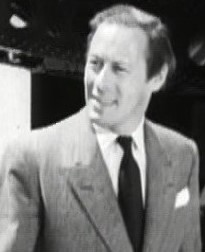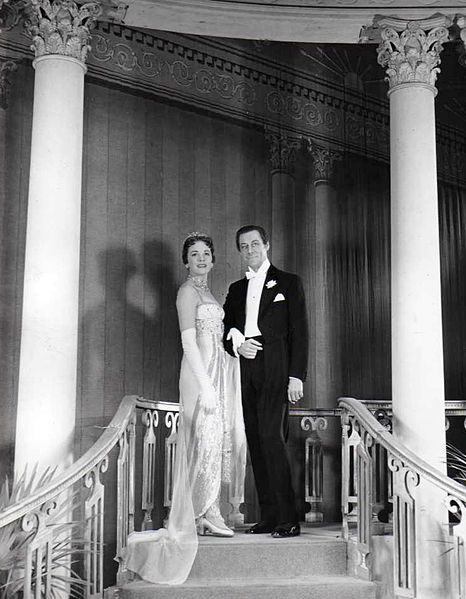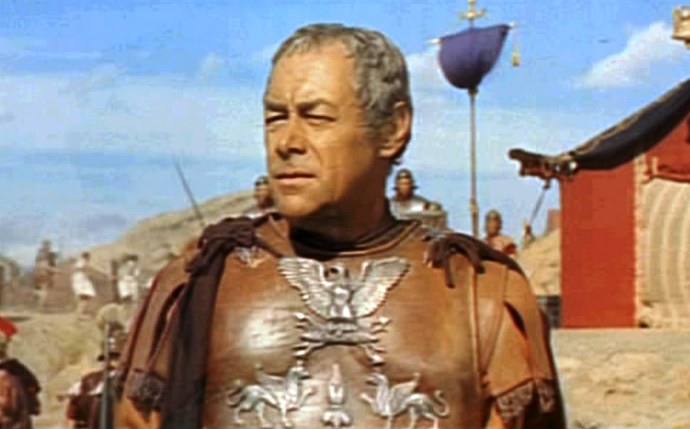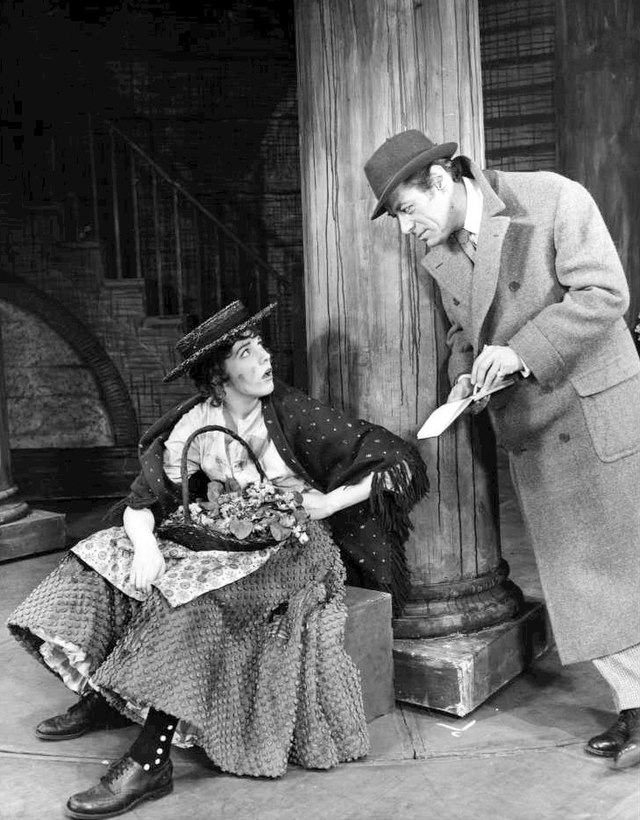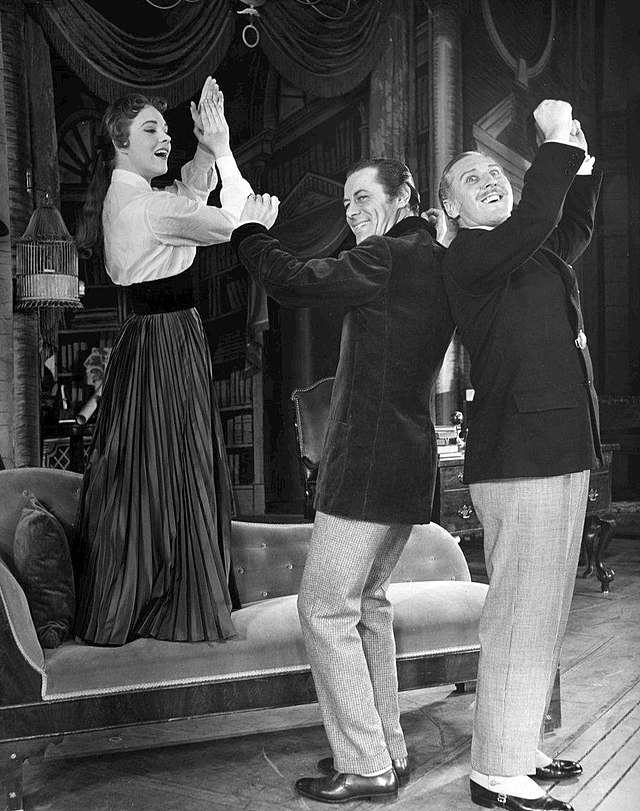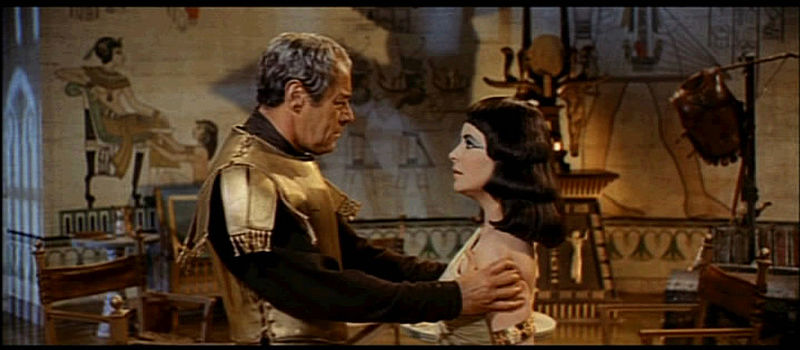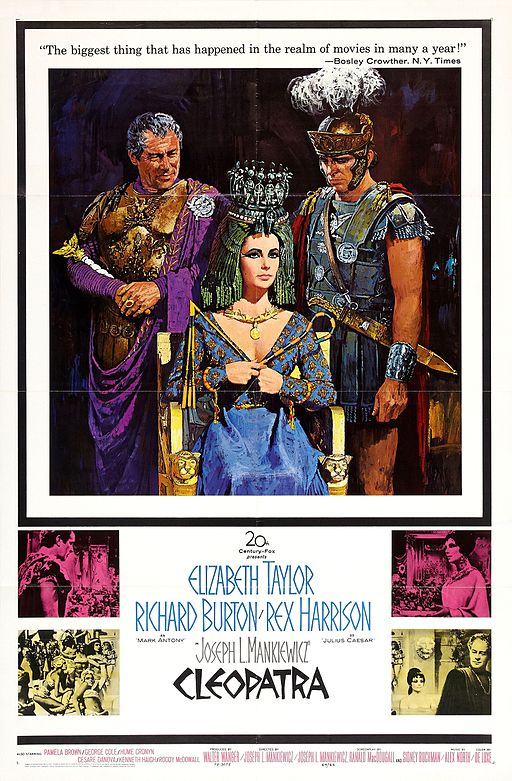Rex Harrison
back| Full Name | Reginald Carey Harrison |
| Stage Name | Rex Harrison |
| Born | March 5, 1908 |
| Birthplace | Huyton, Lancashire (now Merseyside), England |
| Died | June 2, 1990 |
| Buried | Forest Lawn Memorial Park, Glendale, California, USA |
| Married to | Colette Thomas (1934–1942) - Lilli Palmer (1943–1957) - Kay Kendall (1957–1959, her death) - Rachel Roberts (1962–1971) - Elizabeth Rees-Williams (1971–1975) - Mercia Tinker (1978–his death in 1990) |
| Children | Noel Harrison (with Collette Thomas) - Carey Harrison (with Lilli Palmer) |
| Notable films | Ann and the King of Siam (1946) - The Ghost of Mrs. Muir (1947) - My Fair Lady (1964) - Cleopatra (1963) - Doctor Dolittle (1967) |
Rex Harrison
Suave Rexy
Rex Harrison was a distinguished actor known for his sophisticated charm and wit. He began his career in repertory theatre before achieving West End and Broadway success. Harrison's film career soared with "Anna and the King of Siam" (1946) and "The Ghost and Mrs. Muir" (1947).
He won an Academy Award for his iconic role as Professor Henry Higgins in "My Fair Lady" (1964). His personal life was marked by six marriages, including to Lilli Palmer and Kay Kendall.
Related
Rex Harrison (1908 – 1990)
Biography and Career Overview
Reginald Carey Harrison, affectionately known as Rex Harrison, was born on March 5, 1908, in Huyton, a suburb of Liverpool, England. He was the youngest child of Edith Mary (née Carey) and William Reginald Harrison, a cotton broker. Rex was raised in a comfortable middle-class environment, receiving his education at Birkdale School in Southport and later at the prestigious Liverpool College.
From a young age, Harrison showed an inclination towards the arts, particularly acting. His early exposure to theatre through school plays ignited a passion that would shape his future. Despite facing a reserved upbringing, Rex's charm and wit became his signature traits, both on and off the stage.
Path Towards Success
Harrison's professional debut came in 1924 at the Liverpool Repertory Theatre, where he performed in "Thirty Minutes in a Street." This early experience paved the way for numerous roles in repertory theatre across England. By 1930, he had made his West End debut, marking the beginning of a successful stage career.
The outbreak of World War II interrupted his burgeoning career. Harrison served in the Royal Air Force, an experience that left a lasting impact on him. Following the war, he returned to acting with renewed vigor, quickly re-establishing himself as a leading man in British theatre and cinema.
His film career took off with the role of King Mongkut in "Anna and the King of Siam" (1946), followed by a memorable performance in "The Ghost and Mrs. Muir" (1947). These roles showcased his versatility and cemented his status as a prominent actor.
Peak Career and Acclaim
The height of Rex Harrison's career came with his portrayal of Professor Henry Higgins in the stage and film adaptations of "My Fair Lady." His performance on Broadway earned him a Tony Award, and the 1964 film adaptation won him an Academy Award for Best Actor. This role remains one of his most iconic, demonstrating his ability to blend humor, sophistication, and a commanding stage presence.
Throughout the 1960s and 1970s, Harrison continued to thrive in both film and theatre. Notable films during this period include "Doctor Dolittle" (1967) and "Cleopatra" (1963), where he played Julius Caesar opposite Elizabeth Taylor. Despite some controversies and mixed reviews, his talent and charisma were undeniable.
Marriages and Personal Turmoil
Harrison's personal life was as colorful as his professional one, marked by six marriages and numerous high-profile relationships:
- Colette Thomas (1934–1942): Harrison's first marriage produced a son, Noel Harrison, who went on to become a singer and actor.
- Lilli Palmer (1943–1957): This marriage was particularly significant, as Palmer was a celebrated actress in her own right. They had one son, Carey Harrison, who became a playwright and novelist.
- Kay Kendall (1957–1959): Harrison's marriage to Kay Kendall was tragically cut short by her death from leukemia. His devotion to her during her illness endeared him to the public.
- Rachel Roberts (1962–1971): This tumultuous marriage ended in divorce, with both parties struggling with personal demons.
- Elizabeth Rees-Williams (1971–1975): Another short-lived marriage that ended in divorce.
- Mercia Tinker (1978–1990): Harrison's final marriage lasted until his death, providing him with stability in his later years.
Passions and Interests
Apart from acting, Harrison had a passion for music and was known for his distinctive singing style, particularly in "My Fair Lady." He also had a love for classical literature and was an avid reader. His sophisticated demeanor extended to his personal interests, including a taste for fine dining and an appreciation of the arts.
Later Years and Death
In his later years, Rex Harrison continued to perform, though his health began to decline. Despite suffering from glaucoma and other ailments, he remained active in theatre, notably in a revival of "My Fair Lady" and in the Broadway production of "A Matter of Gravity" alongside Katharine Hepburn.
Harrison's health took a severe turn when he was diagnosed with pancreatic cancer. He passed away on June 2, 1990, at his home in Manhattan, New York City. His death marked the end of an era, but his legacy lived on through his numerous contributions to film and theatre.
Academy Award 1965 for Rex Harrison:
Analysis of Rex Harrison’s Acting Style:
Sophistication and Elegance: Rex Harrison was known for his sophisticated and elegant demeanor, both on and off-screen. His performances were often characterized by a refined and polished style, which set him apart from many of his contemporaries. Harrison's natural aristocratic bearing and impeccable manners made him the ideal choice for roles requiring a touch of class and sophistication.
Commanding Presence: Harrison possessed a commanding stage presence that drew the audience's attention whenever he appeared. His tall, lean figure and sharp features added to his authoritative presence, making him a compelling figure in both leading and supporting roles. This presence was particularly evident in his portrayal of figures of authority, such as Professor Henry Higgins in "My Fair Lady" and Julius Caesar in "Cleopatra."
Wit and Humor: One of Harrison's most defining traits was his sharp wit and sense of humor. He had a remarkable ability to deliver lines with a dry, sardonic edge, often laced with a touch of irony. This made him exceptionally effective in comedies and light-hearted dramas. His performances in films like "Unfaithfully Yours" and "Blithe Spirit" showcased his adeptness at balancing humor with sophistication.
Verbal Dexterity: Harrison's verbal dexterity was another hallmark of his acting style. He had a unique way of delivering dialogue that was both articulate and engaging. His clear, crisp diction and melodic voice allowed him to handle complex and wordy scripts with ease. This skill was particularly evident in his role as Professor Henry Higgins, where his ability to handle the intricacies of Shaw's and Lerner's dialogue was crucial.
Subtlety and Nuance: Unlike many actors of his time who relied on grand gestures and overt expressions, Harrison often employed a more subtle and nuanced approach to his performances. He had the ability to convey a wide range of emotions through slight changes in expression, tone, and body language. This subtlety made his characters feel more authentic and relatable, allowing audiences to connect with them on a deeper level.
Versatility: Despite being best known for his roles in sophisticated comedies and dramas, Harrison demonstrated considerable versatility throughout his career. He seamlessly transitioned between stage and screen, excelling in a variety of genres including historical epics, romantic fantasies, and musicals. His adaptability and willingness to take on diverse roles showcased his range as an actor.
Controlled and Measured Performances: Harrison's performances were often characterized by a sense of control and precision. He was meticulous in his approach, carefully calibrating his performances to suit the tone and style of each production. This measured approach ensured that his characters were always believable and well-rounded, whether he was playing a charming rogue or a stern authority figure.
Emotional Restraint: While capable of expressing deep emotion, Harrison often practiced a degree of emotional restraint in his performances. This restraint added a layer of complexity to his characters, making their moments of vulnerability and passion all the more impactful. His portrayal of King Mongkut in "Anna and the King of Siam" is a prime example of this, where his controlled performance highlighted the inner turmoil and dignity of the character.
Stage to Screen Transition: Harrison's background in theatre significantly influenced his screen acting. His theatrical training imbued him with a strong sense of timing, projection, and audience awareness. These skills translated well to the screen, where his ability to maintain focus and deliver compelling performances, even in close-up shots, set him apart from actors who primarily worked in film.
Signature Singing Style: In musical roles, Harrison developed a distinctive singing style that was more akin to spoken word set to music, known as "talk-singing." This approach was perfectly suited to his character in "My Fair Lady," where the songs required clear enunciation and expressive delivery rather than traditional singing prowess. His performance in the musical remains iconic and exemplifies his innovative approach to blending acting and musical performance.
Personal Quotes from Rex Harrison:
On Acting and Career:
- "Exhilaration is that feeling you get just after a great idea hits you, and just before you realize what’s wrong with it."
- "There’s a much simpler way of making a living than being an actor. But what’s the fun in that?"
On Life:
- "Life isn't long enough to do all you could accomplish. And what a privilege even to be alive. In spite of all the pollutions and horrors, how beautiful this world is."
On His Role in "My Fair Lady":
- "There is not a more happy, gracious, and pleasing reward in life than being applauded for something you have really worked on and believed in."
On Acting Style:
- "Whatever it is that makes a character memorable, I’ve got it."
On Success:
- "If you’re going to be a star, you should look like one."
On Theatre:
- "The only privilege that goes with acting is the standing ovation at the end of a performance. Nothing else."
On His Personal Life:
- "I’ve made some sacrifices to stay in show business, but they’ve been worth it."
On His Public Image:
- "Some people are so full of themselves that you could be forgiven for thinking they were the most important people on the planet. I may have been guilty of that at times, but I tried to do it with a sense of humor."
What Others Said about Rex Harrison:
Fellow Actors and Directors
Julie Andrews (Co-star in "My Fair Lady" on Broadway):
- "Rex Harrison was a consummate professional. Working with him in 'My Fair Lady' was an education in itself. His presence on stage was commanding, and his dedication to his craft was inspiring."
Audrey Hepburn (Co-star in "My Fair Lady" film):
- "Rex was a perfectionist, and that perfectionism brought out the best in everyone around him. He could be difficult, but only because he cared so deeply about the work."
George Cukor (Director of "My Fair Lady"):
- "Rex had a unique talent for bringing characters to life with sophistication and a sharp wit. His portrayal of Professor Higgins was nothing short of masterful."
Lilli Palmer (Actress and Harrison's second wife):
- "Rex was a complex man, full of contradictions. He was charming and infuriating in equal measure, but his talent was undeniable."
Critics and Historians
Kenneth Tynan (Theatre Critic):
- "Harrison’s talent lay in his ability to convey a range of emotions with subtlety and grace. He had an aristocratic air that made him ideal for roles requiring a certain refinement."
David Shipman (Film Historian):
- "Rex Harrison's performances were marked by a sophisticated wit and an elegance that made him a standout in both stage and film productions. He had an extraordinary ability to inhabit his characters fully."
Pauline Kael (Film Critic):
- "Harrison had a flair for making the most complex dialogue sound effortless. His performances were a masterclass in the art of verbal dexterity."
Co-Stars and Collaborators
Roddy McDowall (Actor and Friend):
- "Rex had a kind of charisma that was hard to define but impossible to ignore. He was a brilliant actor and a fascinating human being."
Stanley Holloway (Co-star in "My Fair Lady"):
- "Rex could be demanding, but it was because he had such high standards for himself and everyone around him. Working with him was both challenging and immensely rewarding."
Richard Burton (Actor):
- "Rex Harrison was one of the greats. His ability to command the stage and the screen was unparalleled. He had a way of making every line memorable."
Awards and Recognition:
Academy Awards (Oscars)
- 1965: Won – Best Actor for "My Fair Lady"
- 1967: Nominated – Best Actor for "Doctor Dolittle"
Tony Awards
- 1949: Won – Best Actor in a Play for "Anne of the Thousand Days"
- 1957: Won – Best Actor in a Play for "My Fair Lady"
- 1984: Nominated – Best Actor in a Play for "The Circle"
Golden Globe Awards
- 1946: Nominated – Best Actor in a Leading Role for "Anna and the King of Siam"
- 1948: Nominated – Best Actor in a Leading Role for "The Ghost and Mrs. Muir"
- 1950: Nominated – Best Actor in a Leading Role for "The Foxes of Harrow"
- 1965: Won – Best Actor in a Motion Picture – Musical or Comedy for "My Fair Lady"
- 1968: Nominated – Best Actor in a Motion Picture – Musical or Comedy for "Doctor Dolittle"
British Academy Film Awards (BAFTA)
- 1965: Nominated – Best British Actor for "My Fair Lady"
Laurence Olivier Awards
- 1984: Nominated – Best Actor in a Play for "The Circle"
David di Donatello Awards
- 1965: Won – Best Foreign Actor for "My Fair Lady"
- 1968: Won – Best Foreign Actor for "Doctor Dolittle"
National Board of Review Awards
- 1964: Won – Best Actor for "My Fair Lady"
Golden Apple Awards
- 1958: Won – Sour Apple (least cooperative actor)
Walk of Fame
- 1960: Honored – Star on the Hollywood Walk of Fame for his contributions to the film industry.
Special Tony Award
- 1969: Won – Special Tony Award for his contributions to theatre.
Theatre World Awards
- 1947: Won – Theatre World Award for his performance in "Henry IV"
San Sebastián International Film Festival
- 1965: Won – Silver Seashell for Best Actor for "My Fair Lady"
Movies featuring Rex Harrison:
1930: "The Great Game"
Synopsis: A British film about the world of football (soccer), focusing on the management and players of a fictional football club.
1931: "The Bailiffs"
Synopsis: A British short comedy film where Harrison played a minor role.
1936: "Get Your Man"
Synopsis: A comedy involving misunderstandings and romantic entanglements.
1937: "Storm in a Teacup"
Synopsis: A comedy where a reporter stirs up trouble in a small Scottish town, leading to political chaos.
1938: "School for Husbands"
Synopsis: A comedy about a man who tries to win back his wife by following a self-help book.
1938: "The Citadel"
Synopsis: A drama about an idealistic young doctor who becomes disillusioned with the medical establishment.
1940: "Ten Days in Paris"
Synopsis: A romantic comedy involving mistaken identities in Paris.
1941: "Major Barbara"
Synopsis: A film adaptation of George Bernard Shaw's play about a Salvation Army officer who must confront the morality of her father's munitions business.
1942: "Night Train to Munich"
Synopsis: A thriller about a British agent who helps a scientist and his daughter escape from Nazi-occupied Europe.
1942: "Unpublished Story"
Synopsis: A war-time drama about journalists covering the early stages of World War II.
1945: "Blithe Spirit"
Synopsis: A comedy about a novelist who is haunted by the ghost of his first wife after a séance.
1945: "The Rake's Progress"
Synopsis: A drama tracing the rise and fall of an ambitious young man.
1946: "Anna and the King of Siam"
Synopsis: A historical drama about the relationship between the King of Siam and an English schoolteacher.
1947: "The Ghost and Mrs. Muir"
Synopsis: A romantic fantasy where a young widow falls in love with the ghost of a sea captain.
1947: "The Foxes of Harrow"
Synopsis: A drama set in antebellum New Orleans about the rise of a self-made man.
1948: "Escape"
Synopsis: A thriller about a man who escapes from a mental asylum to clear his name.
1948: "Unfaithfully Yours"
Synopsis: A black comedy about a jealous husband who imagines different scenarios of revenge when he suspects his wife of infidelity.
1950: "The Black Rose"
Synopsis: An adventure film about an Englishman and his companion traveling to China in the 13th century.
1951: "The Long Dark Hall"
Synopsis: A mystery thriller about a man accused of murder and his wife who tries to prove his innocence.
1951: "A Day to Remember"
Synopsis: A drama about a group of British workers who travel to France for a day trip.
1952: "The Four Poster"
Synopsis: A drama that chronicles the ups and downs of a marriage over several decades, set around a four-poster bed.
1953: "A Kiss for Corliss"
Synopsis: A comedy about a teenage girl who tells a fib that spirals out of control.
1954: "King Richard and the Crusaders"
Synopsis: A historical adventure about Richard the Lionheart during the Crusades.
1955: "The Constant Husband"
Synopsis: A comedy about a man who wakes up to find he has amnesia and is married to multiple women.
1956: "The Reluctant Debutante"
Synopsis: A comedy about an American teenager who reluctantly makes her debut in British high society.
1959: "The Big Fisherman"
Synopsis: A religious epic about the life of Simon Peter, one of Jesus's disciples.
1960: "Midnight Lace"
Synopsis: A thriller about an American woman in London who is terrorized by anonymous threats.
1961: "The Happy Thieves"
Synopsis: A crime comedy about art thieves in Europe.
1963: "Cleopatra"
Synopsis: A historical epic about the life of Cleopatra, focusing on her relationships with Julius Caesar and Mark Antony.
1964: "My Fair Lady"
Synopsis: A musical about a phonetics professor who makes a bet that he can transform a Cockney flower girl into a refined lady.
1965: "The Agony and the Ecstasy"
Synopsis: A historical drama about the conflict between Michelangelo and Pope Julius II during the painting of the Sistine Chapel.
1967: "Doctor Dolittle"
Synopsis: A musical about a doctor who can talk to animals and goes on adventures to find rare creatures.
1967: "The Honey Pot"
Synopsis: A comedy about a wealthy man who sets up a fake death to test his friends' loyalty.
1969: "Staircase"
Synopsis: A comedy-drama about an aging gay couple living in London.
1971: "A Flea in Her Ear"
Synopsis: A farce about a woman who tries to trap her supposedly unfaithful husband.
1973: "Ash Wednesday"
Synopsis: A drama about a middle-aged woman who undergoes plastic surgery to win back her husband.
1977: "The Fifth Musketeer"
Synopsis: A swashbuckling adventure about the story of the man in the iron mask.
1980: "The Happy Hooker Goes Hollywood"
Synopsis: A comedy about a woman who tries to produce a movie based on her best-selling book.
1982: "The Fifth Musketeer"
Synopsis: An adventure film where Harrison played an older version of one of the famed musketeers.
1983: "A Time to Die"
Synopsis: A thriller about a man seeking revenge for his family's murder.
1984: "The Ghoul"
Synopsis: A horror film where a scientist's experiments create terrifying results.

